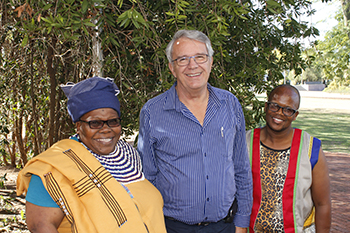Latest News Archive
Please select Category, Year, and then Month to display items
01 June 2023
|
Story Nicole Bongo
|
Photo Supplied
 University of the Free State students participating in one of the many projects coordinated by the Engaged Scholarship Office.
University of the Free State students participating in one of the many projects coordinated by the Engaged Scholarship Office.
To help make a change and push for sustainable development, the University of the Free State Division of Student Affairs works with communities around Bloemfontein fostering a culture of creating sustainable solutions.
Gernus Terblanche, Kovsie Support Services and Assistant Researcher in the Division says, ‘it is important for the university to be actively involved in the community as it makes up such a large portion of the Bloemfontein and students also
represent many different communities on and off- campus.’
Terblanche said: “As an educational institution it is vital for the UFS to support and guide students towards creating innovative solutions; both local and globally. Our experience is that students often come up with real solutions that can
make a real impact in the lives of real people – and it would be crucial to support such initiatives.”
The office has worked with BloemShelter, VermiVillage, GAP Equip, National Hospital and as part of the programmes of 2022 also with Lighuis, Talita Cumi, ROC Kids and the Universitas Neighborhood association. “We are also very fortunate to have,
Shanen Emam, Miss Free State 2023 as one of our students that are involved with our programmes,” added Terblanche.
One of the students involved is Prince Sijane, Bloemfontein Campus Student Representative Council member responsible for Civic and Social Responsibility when asked why student participation is important, he said, “By actively participating in
initiatives that address social issues or promote community well-being, students become more aware of the challenges faced by society.”
Tereblanche said: “The produce of these gardens addresses hunger and malnutrition amongst students on campus. KovsieACT also facilitates an eco-vehicle project during which student teams learn how to build electric vehicles powered by solar charging
stations. This project is aimed at developing skills appropriate to the 4th Industrial Revolution and sustainable resources development including clean and green energy.”
UFS Faculty of Theology hosts expert on African Traditional Religion (ATR)
2016-05-20

Dr Nokuzola Mndende, Prof Fanie Snyman (Dean of the Faculty of Theology), and Dr Luvuyo Ntombana (Department Head: Religion Studies) |
Dr Nokuzola Mndende, an acclaimed theologian, researcher, and practitioner of African Traditional Religion (ATR), is often called upon in the media to offer her expert opinion or participate in interfaith panel discussions. Thanks to an initiative from the postgraduate diploma class in the Faculty of Theology and the efforts of Dr Luvuyo Ntombana (Department Head: Religion Studies; Faculty of Theology), Dr Mndende accepted an invitation to present her paper, “From the periphery to the centre: African Traditional Religion in a democratic state”, on the Bloemfontein Campus of the University of the Free State (UFS). In his opening remarks, Dr Ntombana stated that he was heartened by his students’ desire to be “co-workers in knowledge production” by engaging with Dr Mndende.
Dr Mndende’s contention is that African Traditional Religion (ATR) was suppressed throughout colonial times, and, despite a 22-year-old democracy, continues to be moved to “beyond the periphery” by what she terms “spiritual subsets”; those who strive to amalgamate their African Traditional Religion rituals with the practices of Christianity. Quoting statistics from a 1995 survey by the SABC, she stated that ATR is a minority in its birthplace (with only 5% representation), and posed the question: “If ATR is a minority in its place of birth, where is it a majority?” Her presentation put forward the need to study and interpret ATR introspectively, but acknowledged that more “homework” would be needed in this regard.
Dr Mndende thanked the university, Dr Ntombana, and the Dean of the Faculty of Theology, Prof Fanie Snyman, for inviting her, and expressed a desire for the relationship with the UFS to continue.